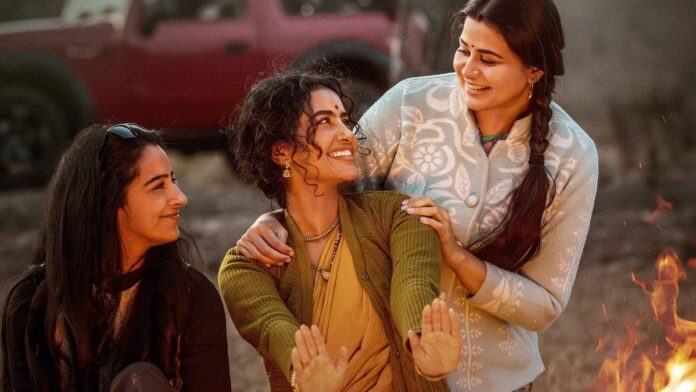Paradha Review – A Brave Concept That Struggles to Find Its Feet
In a remote village, the centuries-old tradition of wearing the Paradha is tied to the revered Goddess Jwalamma, with dire consequences for those who break the custom. Subbu (Anupama Parameswaran) finds herself at the center of controversy when a photographer captures her without the Paradha, igniting fear, scandal, and superstition. As the village grapples with the fallout, Subbu must navigate threats to her safety while confronting rigid societal norms.
Anupama Parameswaran steps into a role that has the potential to define her career, bringing sincerity and commitment to Subbu’s challenging journey. While the character’s arc and the script’s uneven moments slightly limit the impact, Anupama’s performance remains heartfelt and engaging, showing glimpses of the depth she is capable of delivering. Darshana Rajendran, portraying Ami, is a standout; her vibrant presence and natural ease make every scene she inhabits a delight, proving that she was perfectly chosen for the role. Together, the leads bring authenticity and charm, even when the narrative occasionally falters.
Paradha, directed by Praveen Kandregula, tackles an age-old village tradition centered on the Paradha and the curse believed to follow when it is removed. The film opens with a compelling premise, and the backdrop of Goddess Jwalamma adds a touch of intrigue, though it never fully captivates. Subbu (Anupama Parameswaran) finds herself at the center of superstition and danger, but while her journey starts with promise, the emotional depth and arc of her character remain underexplored. Scattered moments of engagement and a few well-crafted sequences, such as Subbu’s moments of realization and her interactions with Ami (Darshana Rajendran), inject energy into the story, yet they are too few to elevate the narrative consistently.
The second half leans into progressive themes around feminism and women-centric issues, but the integration feels uneven, and the setting occasionally undercuts the film’s rooted appeal. Songs and certain plot points feel staged rather than organic, and while the climax ties the story together neatly, it lacks the tension or surprise needed to leave a lasting impact. Praveen Kandregula’s attempt at an innovative, socially conscious tale is evident, but the execution falls short of the story’s potential. Paradha works best as a film with good intentions, yet its diluted treatment keeps it from being truly memorable.
In Paradha, the performances thrive less on star power and more on how the actors inhabit the village world. Anupama Parameswaran anchors the film with quiet determination, portraying Subbu’s struggle against superstition with subtlety, even if the character’s emotional arc could have been deeper. Darshana Rajendran’s Ami is the spark that consistently energizes the screen; her charisma and effortless ease provide a counterbalance to Subbu’s tension, making her scenes genuinely engaging.
The supporting cast adds texture without overwhelming the narrative. Sangitha as the aunt brings a grounded warmth, while Harsha Vardhan complements her with calm authority. Rag Mayur, though brief, injects nuance into his role, reminding viewers of the director’s recurring ensemble. The father figure, though underwritten, hints at emotional layers that could have elevated the personal stakes. Collectively, the cast succeeds in creating a believable village ecosystem, giving Paradha a sense of lived-in authenticity even when the story itself drifts.
Technically, Paradha presents a mixed bag. Gopi Sundar’s soundtrack struggles to make an impact, with the songs feeling underwhelming both aurally and visually, though his background score effectively heightens the emotional and tense moments throughout. Mridul Sujit Sen’s cinematography adds a strong visual layer, especially in the first half, capturing the village’s texture and landscapes with a sense of realism that complements the story. Editing by Dharmendra Kakarala, however, occasionally hampers the rhythm, as certain scenes drag longer than necessary. The production design from Ananda Media remains solid, providing a believable setting that supports the narrative without overshadowing it. Collectively, the technical elements maintain a competent framework, even if they rarely elevate the film beyond its story.
On the whole, Paradha has a compelling idea based on sensitive serious social issue to discuss. However, when it comes to narrative and presentation, it lacks the punch. If the screenwriting was kept much more intact, this powerful idea would have found an elevated engrossment.
Paradha Movie Review
-
SF Rating
Summary
Verdict: Good intentions, but execution falls short.

